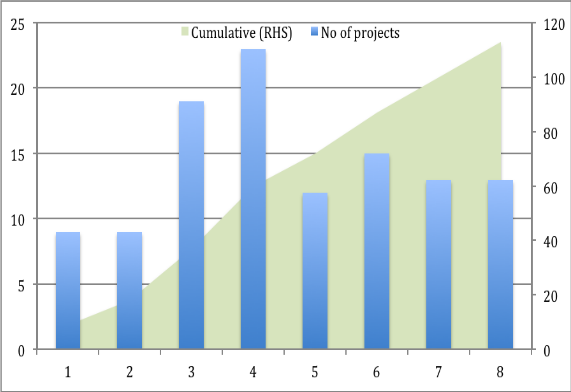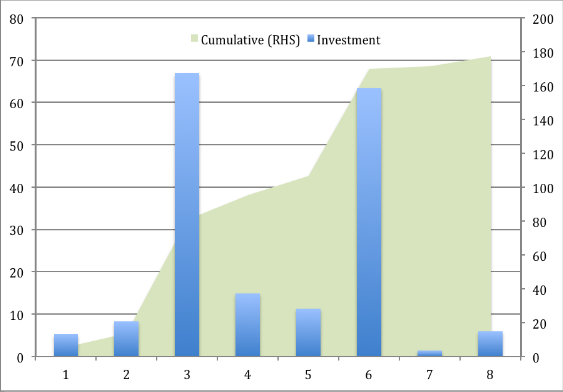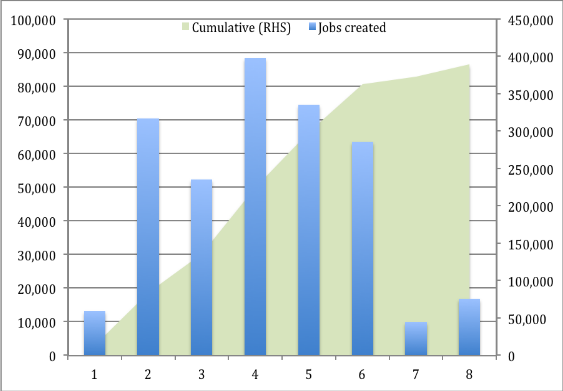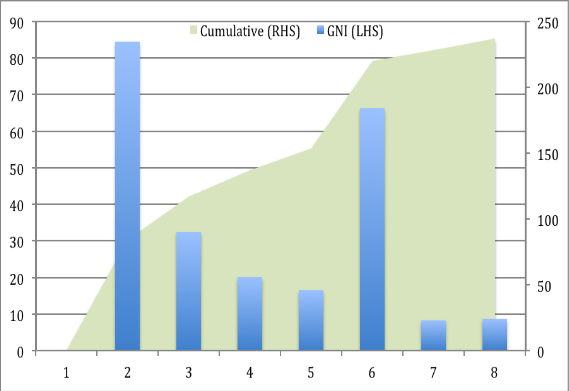Very swift progress, but is it due to PEMANDU? In its 8 ETP updates so far, PEMANDU has announced multiple new EPPs (Entry Point Projects) worth billions of ringgit of investment and creating thousands of jobs. One EPP – Johor Premium Outlets (JP Outlets) – is already open. But how much of this rapid execution is due to PEMANDU instead of normal private sector efficiency?
Opportunistic naming of existing projects as EPPs. For example, the JP Outlets and St Regis Hotel projects pre-dated the ETP. Their completion dates were unchanged by their subsequent EPP status – suggesting minimal input by PEMANDU. Naming them as EPPs gives the illusion of quick wins and overstates PEMANDU’s success.
PEMANDU might have indeed helped. PEMANDU might respond that these projects would have been delayed without its help in cutting red tape. Note that the developers Genting-Simon Property and Chua Ma Yu-MRCB are global multinationals, a prominent local businessman and a GLC.
Such help strengthens the ‘know-who’ cancer. If such big guns are unable to navigate the bureaucratic maze on their own, what about ordinary Malaysians? In its role as red tape-cutter, PEMANDU stifles entrepreneurship by setting itself up in the position of choosing winners. It does not matter how good your idea is, it depends on who you know to get it through the system.
The ‘hothouse’ labs probably killed innovation. Naming already existing projects as EPPs suggests the ETP is more ‘business-as usual’ rather than the ambitious departure from the norm it claims to be. We do indeed see serious flaws in the lab process.
The ETP is apparently well on track …1
Chart 1: PEMANDU has announced a total 113 Entry Point Projects (EPPs) in 8 updates so far …

Note: PEMANDU’s total includes 6 Recap EPPs and 3 SRIs (Strategic Reform Initiatives). Recap EPPs are EPPs which have been made public in between the updates2.
Chart 2 : … worth a total RM177 billion investment value …

Note: The RM36.6 billion MRT and RM60 billion Petronas RAPID EPPs boosted the numbers in Updates 3 and 6 respectively.
Chart 3: … with the potential to create nearly 390,000 jobs by 2020 ….

Note: A few EPPs account for a high proportion of new jobs created. For example, the TUKAR (Update 4) and Pasar Komuniti (Update 5) EPPS are expected to create 51,000 and 56,000 jobs respectively3.
Chart 4 : … and generate RM237 billion of gross national income (GNI).

Note: The Tanjong Agas and Petroleum Incentives EPPs boosted the numbers in Update 2; RAPID contributed most of the GNI contribution expected in Update 6.
It’s too good to be true …
By November 2011, less than 14 months after the launch of the ETP (Economic Transformation Programme)4, PEMANDU5 had announced a total 113 projects worth RM177 billion and with the potential to create nearly 390,000 jobs:
-
The RM177 billion of investments is well above the RM140 billion per year average required to hit RM1.4 trillion by 2020;
-
97 of the 113 EPPs (Entry Point Projects) are in progress. One EPP is already open for business – a Premium Outlet Centre in Kulaijaya, Johor under the Tourism NKEA.
PEMANDU appears well on track. Each of the eight ETP updates so far heralded multiple new EPPs (Entry Point Projects) generating thousands of jobs and billions of ringgit of investment. The tone is exhilarating, extolling the considerable progress and huge investments. There is nary a murmur of hitches.
That already raises questions. All of us have experienced having to refine, amend, and sometimes, abort plans. Rain ruins satay dinner at our favourite stall; floods in Thailand wreak havoc on the operations of the famously meticulous Japanese car-makers.
The highly-paid team at PEMANDU and its expensive consultants6 might be better able to avoid the hitches that mere mortals like us run into, but still, a plan that is as ambitious and transformative as the ETP is bound to run into hurdles and roadblocks. It stretches credulity – that all has been hunky-dory with the ETP ever since its launch in Oct 2010.
REFSA finds that, indeed, not all is well behind the glitzy façade. We now focus on Execution – the ‘E’ in DEEDS, the framework with which we are evaluating PEMANDU and the ETP. This will cover 3 Parts:
-
Part 3 (i) here focuses on the value-added contribution of PEMANDU especially on its role in cutting red tape;
-
Part 3 (ii) will examine the selection of EPPs – particularly how the NKEA lab process can be ‘hijacked’ by vested interests;
-
Part 3 (iii) will use the two massive but economically tenuous EPPs as examples to illustrate the shortcomings in the execution process.
Taking credit when none is due?
Our first execution issue is with the actual contribution of PEMANDU towards some of the EPPs announced.
Some early wins are due to projects that got off the ground before PEMANDU and the ETP were created. For example, take the Johor Premium Outlets that are now open. This is a 50:50 joint venture between Genting Plantations Berhad and the Simon Property Group, a company listed in the New York Stock Exchange:
-
Genting Plantations formally announced this project to Bursa Malaysia in Sept 20097;
-
The much vaunted PEMANDU labs that selected the EPPs that would constitute the ETP were convened only in May 2010;
-
The ground breaking ceremony for the project took place on 5 Aug 2010. This was more than 2 months before the release of the ETP Report at the end of Oct 20108;
-
The project was open in 2011, as per the target in Genting Plantations’ very first announcement to Bursa Malaysia. This was before the term EPP was even heard of. What then was PEMANDU’s contribution?
It smacks of opportunism – that PEMANDU should name this project as an EPP under the Tourism NKEA9 when it was already well under way before the ETP. It is hard to see what PEMANDU contributed to ‘facilitate the implementation and delivery’ of this EPP10.
PEMANDU might claim that its role in the Johor Premium Outlets went way beyond monitoring. It might claim it played an instrumental behind-the-scenes role, as it did with the St Regis Hotel EPP, another project that existed long before PEMANDU and the ETP.
Project completion dates are unchanged despite PEMANDU’s ‘help’
The St Regis project was announced in 2008, but according to Minister Datuk Seri Idris Jala, CEO of PEMANDU, EPP status resulted in the building approval process being expedited:
There’s an entrepreneur who wanted to build a six-star hotel in Kuala Lumpur, a St. Regis hotel. He went around the mulberry bush trying to secure approvals for two years. He got frustrated and could not get approval. On October 25th last year, it was announced as one of the new projects. Two weeks later, piling began for this project11.
REFSA, however, is puzzled. The St Regis Kuala Lumpur is still scheduled to be open in 201412, which is unchanged from when the project was announced13. Just as in the Johor Premium Outlets, PEMANDU’s involvement does not seem to have sped up this project.
As these two examples show, PEMANDU’s involvement has not speeded up completion dates. The fast pace of execution of the ETP that PEMANDU showcases may be due more to the normal efforts of the private sector participants than to PEMANDU’s help.
PEMANDU already uses the term ‘Recap EPPs’ for EPPs which had been separately announced prior to specific ETP Updates. It is even more important that pre-existing projects such as the Johor Premium Outlets and St Regis be separately listed and catalogued, and not called EPPs, so as to differentiate between projects where PEMANDU had substantial input, and pre-existing projects for which it might help somewhat in execution but cannot take full credit.
By doing this, PEMANDU can avoid the criticism that it is misleading the public by attempting to take credit for pre-existing projects. It would also then be in a position to take full and rightful credit for the truly fresh EPPs that were nurtured in its labs and blossomed to completion under its leadership.
Is PEMANDU reinforcing the ‘know-who’ cancer?
PEMANDU might respond that the projects are on track only because of its help. Without PEMANDU and the ETP, their completion dates would have been delayed. This may be true, but begs the question as to why the listed companies involved did not publicly announce the likely delays. The problems would have been apparent long before these projects were selected as EPPs.
Taking PEMANDU at face value presents an even more frightening picture. Consider this:
-
Genting Plantations is part of the huge Genting group, which generates billons of ringgit of profit from extensive operations all over the world. It has businesses from Singapore to New York and includes 5 listed companies in 3 jurisdictions;
-
Its partner in Johor Premium Outlets, Simon Property Group, Inc., is the largest real estate company in the U.S. with assets in North America, Europe and Asia;
-
St Regis Kuala Lumpur is promoted by prominent local businessman Chua Ma Yu and Malaysian-listed conglomerate Malaysian Resources Corporation Berhad, which also happens to be a major government-linked corporation (GLC) with a track record of building many high rises in the KL Sentral development area where the St Regis Kuala Lumpur hotel is located.
Have our government and bureaucracy become so business unfriendly that huge multi-nationals like Genting Group and Simon Property need to engage a ‘fixer’ like PEMANDU to shepherd their projects through?
Has our government become so cut off from its grassroots that even a GLC and a prominent local businessman are unable to navigate the maze of approvals required to get a project off the ground?
If so, where does that leave the ordinary small Malaysian entrepreneur trying to get his fledging business under way?
PEMANDU, acting as ‘enabler’ and cutting red tape is unwittingly reinforcing the cancer of ‘know-who’ rather than ‘know-how’ that is killing Malaysian innovation, creativity and productivity. It does not matter how good your product or idea is, or how efficiently you can make it, it depends on who you know to get it through the system.
Genting-Simon Property Group and Chua Ma Yu-MRCB got through, but how many others are stalled because they do not have the benefit of PEMANDU’s red tape-cutting shears?
To be truly transformative, PEMANDU must make it a primary goal to
cut the red tape and make sure it does not come back to stifle other genuine entrepreneurs.
Better yet, PEMANDU should indicate how it was able to ‘facilitate’ in the implementation of such pre-existing projects and how these facilitation measures are being translated into long-term policy changes, one of which is to reduce red tape as stated in the Strategic Reform Initiatives (SRIs).
Otherwise, PEMANDU is setting itself up to be a permanent entity, with the job of selecting ‘winners’ from a beauty parade of projects striving for EPP status. This merely institutionalises the government-knows-best mentality, rather than promotes the private sector initiative which is a key pillar of the ETP.
The ‘hothouse’ labs probably killed innovation
Going back to the very foundations of the ETP, PEMANDU makes much of the 12 NKEA ‘labs’ that brought together 500 experts from the private and pubic sectors to define and detail the ETP.
These labs, in 8 short weeks, detailed and defined the 131 EPPs (Entry Point Projects) across the 12 NKEAs (National Key Economic Areas) that make up the ETP.
However, by naming already existing projects as EPPs, the ETP might be depicted as yet another project ‘grabfest’ and not the ambitious departure from the norm and programme it claims to be.
REFSA sees fundamental defects in the process of selecting the EPPs. The ‘hothouse’ labs would have favoured incumbents with existing business plans rather than entrepreneurs with transformative ideas. More next week!
Note on Part 2:
We thank Nurhisham who blogs at http://econsmalaysia.blogspot.com/ for pointing out that our GDP Deflator calculations in Part 2 of our critique were not accurate14. After recalculating, we find that the GDP Deflator from 2001 to 2009 increased at an annual rate of 3.7% rather than the 5% listed in Exhibit 1 on page 6.
About this series
Critics of PEMANDU and the ETP thus far have tended to focus on the expensive costs incurred by PEMANDU and its consultants, accusations of style prevailing over substance, the execution of specific projects (such as the MRT and 1 Malaysia email) and its apparently lofty, unrealistic targets.
We think these issues can be further debated, but these questions ultimately boil down to PEMANDU’s raison d’être. PEMANDU is already a fait accompli. Debating its existence serves no useful purpose at this point.
Instead, we evaluate PEMANDU and the ETP on its own terms by looking at the goals, plans and targets outlined in the ETP Roadmap document. Doing so facilitates constructive debate as it uses the same framework which PEMANDU has chosen to work within.
In that vein, and in keeping with the spirit of the alphabet soup of NKEAs, NKRAs, SRIs, EPPs, GNI surrounding the entire GTP, we evaluate PEMANDU and the ETP on its DEEDS:
-
Data transparency – the ease with which an independent analyst can evaluate the figures relevant to the ETP and its targets;
-
Execution – the progress, or lack thereof, of announced EPPs (Entry Point Projects);
-
Enterprise – whether the target of stimulating private investment is being achieved. The ETP aims for a 92:8 split between private and public investments;
-
Distribution – the distribution of EPPs across the NKEAs (National Key Economic Areas), which shows whether a healthy balance of projects is being maintained; and
-
Socio-economic impact – an evaluation of the main beneficiaries of the economic activities generated by the EPPs.
The story so far
In Part 1, Let’s evaluate PEMANDU on its DEEDS, we introduced our evaluation framework.
In Part 2, We won’t really be twice as rich in 2020 we declared “It does not compute!” PEMANDU’s target is to double nominal income per capita to RM48,000 by 2020. But using its forecasts for income and population growth, and inflation, the income target should be RM54,145, not RM48,000. How can we trust this ‘roadmap to economic transformation’ when the highly-paid team at PEMANDU and its costly consultants cannot even get the basic mathematics right?
Note on PEMANDU’s response
Upon hearing that we were writing an evaluation of the ETP, the communications team at PEMANDU kindly arranged interviews with a Director from the Minister’s Office who is also the Director of the Oil, Gas and Energy & Financial Services NKEAs, the Director of the Wholesale and Retail (W&R) NKEA and the Assistant Director of the Tourism NKEA. We are grateful for these interviews and will include clarification points from these interviews in our evaluation. These interviews were recorded by the ETP communications team and we hope that they would be made available online for public access.
About the authors
Visiting contributor Dr Ong Kian Ming holds a PhD in Political Science from Duke University and Economics degrees from the University of Cambridge and the London School of Economics. He is attached to UCSI University, which has been named as the project owner of two Entry Point Projects (EPPs). To avoid any potential conflict of interest, he will not make references to or analyse these two EPPs. He can be reached at [email protected].
REFSA (Research for Social Advancement) Executive Director Teh Chi-Chang holds a first class degree in Accounting & Financial Analysis from the University of Warwick, an MBA from the University of Cambridge and the CFA (Chartered Financial Analyst) charter. Prior to joining REFSA, he headed highly-regarded investment research teams covering Malaysia, and was himself highly-ranked as an analyst. He can be reached at [email protected].
Help REFSA do more!
REFSA is a not-for-profit research institute that provides relevant and reliable information on social, economic and political issues affecting Malaysians. We aim to promote open and constructive discussions that result in effective policies to address these issues.
REFSA depends primarily on donations to fund its operations. Research such as this consumes much time, expertise and effort. Please contribute if you share our vision for a better Malaysia and support our commitment to impartial, constructive analysis. Donations can be:
Made on-line via our website at www.refsa.org.
Banked in directly to our Public Bank account number 3128- 1874-30.
Cheques should be made out to “Research for Social Advancement Bhd”.
Please contact us at [email protected] for receipts.
Credit
REFSA allows authorship of derivative works and other transformations of this publication for personal, non-profit/non-commercial use, subject to the inclusion of proper and appropriate credit to “REFSA – Research for Social Advancement”. REFSA expressly prohibits the use of the whole or any part of this publication for defamatory or criminal purposes.
Other Information
The information in this report has been obtained from and is based upon sources that are believed to be reliable but no guarantee is made as to accuracy and completeness.
________
1 All the data for Charts 1 to 4 were obtained from the ETP website: http://etp.pemandu.gov.my/Progress_Update-@-Progress_Update.aspx. Retrieved 29 Jan 2012.
2 However, some projects which had been announced prior to that particular update were classified as EPPs rather than Recap EPPs, including projects that existed before the ETP. Examples are the Karambunai, Tanjong Agas, St. Regis and Iskandar Educity projects.
3 We shall analyse the creation and distribution of new jobs in detail in a subsequent Focus Paper in this series.
4 The ETP calls for 131 entry point projects (EPPs) within 12 National Key Economic Areas (NKEAs), which will pour RM1.4 trillion worth of investment into the economy and create 3.3 million new jobs by 2020.
5 The acronym that the Performance Management and Delivery Unit within the prime minister’s department is better known by. PEMANDU is the government agency that created and is now steering the ETP.
6 Its eight directors reportedly pocket RM39,000 each per month; while consultants McKinsey were paid RM36 million to set up PEMANDU. Covered in Part 1: Introducing DEEDS.
7 Announcement by Genting Plantations Berhad to Bursa Malaysia, 30 Sept 2009. Ref No GP-090930-3DAD8. Available at www.gentingplantations.com/news/2009/pdf/GPB_30Sep2009b.pdf. Retrieved 29 Jan 2012.
8 Chief minister of Johor officiates ground breaking for Johor Premium Outlets. Genting Plantations press release dated 5 Aug 2010. Available at www.gentingplantations.com/news/2010/pdf/GPB_05Aug2010b.PDF. Retrieved 29 Jan 2012.
9 The ETP report actually identified the establishment of three premium outlets, including the Johor Premium Outlet. Interestingly, the ETP report anticipated the first outlet to be operational only by 2013 (pg 326), despite the public announcement by Genting Plantations that the Johor Premium Outlets would be completed by 2011.
10 The purpose of the ETP unit, as outlined in Pg. 26 of the Executive Summary of the ETP Roadmap Report.
11 Interview published in McKinsey Quarterly, Oct 2011. Available at http://etpblog.pemandu.gov.my/posts/2011/11/02/jump-starting-malaysia%E2%80%99s-growth-an-interview-with-idris-jala/. Retrieved 29 Jan 2012.
12 The St Regis Kuala Lumpur – Opening December 1, 2014. Available at hwww.starwoodhotels.com/stregis/property/meetings/index.html?propertyID=3392. Retrieved 29 Jan 2012.
13 St Regis coming to KL. Available at www.klsentral.com.my/NewsDetail.aspx?NEWSID=395ff40c-5230-45c3-973d-58c49526dcc7. Retrieved 29 Jan 2012.
14 Hisham’s critique of our critique can be found at http://econsmalaysia.blogspot.com/2012/01/critiquing-critique-or-this-is-not-how.html, Retrieved 31st Jan 2012.

#1 by Joshua on Friday, 3 February 2012 - 6:27 am
I think from my brief experience with Pemandu, it is just business as usual where the rich can be richer and the powerful become more powerful,,as it is still very much cronies based and like grabbing other people ideas and projects for FREE.
Pemandu to no where I would say except sucking more other people wealth especially those little ones who turn to them…for some assistance.
In a biased society, where NEP is still in operation, the “white’ angpows tell it all…and it is very clear..
I hope someone can confirm this business as usual despite all the highs lately..sucking more from Sabah and giving back meagre to Sabah…talks are very cheap indeed.
#2 by k1980 on Friday, 3 February 2012 - 8:15 am
http://www.themalaysianinsider.com/malaysia/article/anti-1-care-group-demands-putrajaya-kill-proposed-healthcare-scheme/
“1 Care” is a new national healthcare system that will force all households to surrender nearly 10 per cent of their monthly household incomes as contribution to a government-run Social Healthcare Insurance SHI scheme.
Make this a key issue in the coming 13 GE and PR would be able to secure a 2/3 majority in Parliament. Only dongkois would vote for bn once they are informed about “1Care” or more appropriately, 1Cheat
#3 by Bigjoe on Friday, 3 February 2012 - 8:33 am
Since we are about honesty, the bottom line really is Govt is bad at CREATING VENTURES especially new ventures. Like it or not the best the govt can do is largely help along ventures. There are VERY FEW ventures the govt is really good at that the private sector cannot do better. GLCs are not good ideas, its may be acceptable in a sprinkling of cases but almost always, it becomes a bad idea eventually.
The fact this Pemandu review shows that they body only largely help along should come as no surprise. Its what govt is best at doing. Even in infrastructure where govt scale and authority should be most efficient, at some point, it also becomes inefficient.
The whole point of dumping NEP really IS the fact, because Govt is highly limited in what it can do, its idealistic goal was doomed to fail. The NEP is political superlative for practical reason of implementing it. Even many who voted for it really did not think it would fully work and really did not care even if it failed. That is why it was corrupted from day 1 and got out of hand as controls were lifted.
Ultimately the liberatarian view, no one is owed anything and govt don’t own anything just take it from someone else is correct even if the consequences of that view and too quick of implementation of such a policy could be extremely painful even dehumanising.
#4 by dagen on Friday, 3 February 2012 - 8:38 am
///PEMANDU, acting as ‘enabler’ and cutting red tape is unwittingly reinforcing the cancer of ‘know-who’ rather than ‘know-how’ that is killing Malaysian innovation, creativity and productivity. It does not matter how good your product or idea is, or how efficiently you can make it, it depends on who you know to get it through the system.///
Oh no the cancer DNA has mutated into something far far more potent and deadly!
#5 by waterfrontcoolie on Friday, 3 February 2012 - 12:37 pm
By now, we all know that the larger the Group the better the chances of failure since every member conveniently expects the others to do the job. Essentially, the majority of the so-called brains invited were anyone the KSUs of the ministries could release! So much for their brain power! As for the consultants, they were merely associates or at most managers of such setup. In such scenario, what could be your expectation? On top of this, the objectives have already been set right from the parties with planned interests , so the scence is set for the last hurrah before the curtain is drawn!!
#6 by cemerlang on Sunday, 5 February 2012 - 10:34 am
No need to be a tipu seng. Everyone knows. Even God knows. Datuk. Even God knows.